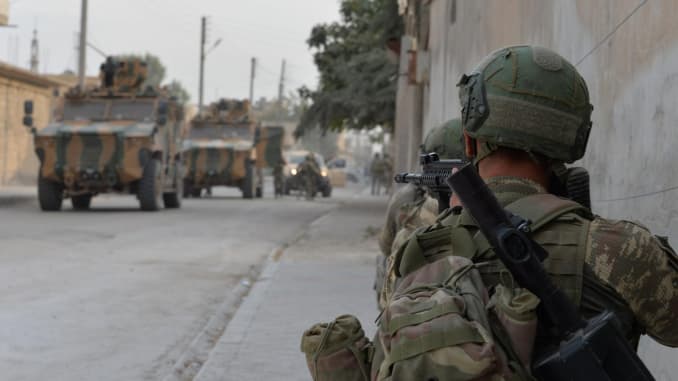- Turkey has agreed to stop attacks in northern Syria for five days as Kurdish fighters retreat from the area following negotiations between Vice President Mike Pence and Turkish President Recep Tayyip Erdogan.
- Trump had faced bipartisan scrutiny for his withdrawal of U.S. troops from Syria, which prompted Turkey’s attack on the Kurdish-held region.
- The withdrawal of the Kurds from the border area has “literally already begun,” Pence said. Turkey views the Kurdish fighters as terrorists, though the United States worked closely with them in the fight against the Islamic State.
Vice President Mike Pence said Thursday that the United States and Turkey had agreed on a five-day Turkish cease-fire, days after the country’s forces launched an offensive in northern Syria.
“It will be a pause in military operations for 120 hours while the United States facilitates the withdrawal of the YPG from the affected areas in the safe zone. And once that is completed, Turkey has agreed to a permanent cease-fire,” Pence said alongside Secretary of State Mike Pompeo in Ankara, Turkey, referring to the mostly Kurdish fighting force.
The withdrawal of the Kurds from the border area has “literally already begun,” Pence said. Turkey views the Kurdish fighters as terrorists, though the United States worked closely with them in the battle against the Islamic State group.
President Donald Trump, who was in Texas for a campaign rally, told reporters later Thursday that “this is an incredible outcome.”

“Everybody said this is tougher than we thought. When those guns start shooting, they tend to do things. But I will tell you, on behalf of the United States, I want to thank Turkey, I want to thank all of the people who have gotten together and made this happen,” Trump said.
Pence said that the agreement entails no further U.S. sanctions on Turkey. Once the permanent cease-fire is in effect, the U.S. sanctions imposed Monday in retaliation for the country’s incursion will be withdrawn, he said.
Turkish Foreign Minister Mevlut Cavusoglu said that the agreement was not a “cease-fire” shortly after Pence spoke. Turkey will continue to control the border zone, Cavusoglu said, according to state media.
Pence declined to cite specific concessions made by Turkey, though he added that those will be evident when the full agreement is made public.

“The agreement today, first, ends the violence, which is what President Trump sent us here to do,” Pence said. “We have also achieved an opportunity, by working with YPG to move out of the area, to create more peace and security and stability in that buffer zone.”
He said that the United States had repeated assurances from the Kurdish fighters that they will leave the border zone, and that they “greatly welcome the opportunity for a cease-fire, to make a safe and orderly withdrawal from those areas in the safe zone where they still have a presence, and we are very confident that that’s already taking place.”
The announcement came after Pence and Pompeo met with Turkish President Recep Tayyip Erdogan. Pence said that negotiations lasted more than five hours with Erdogan and his team.
Prior to the Pence-Pompeo press conference, Trump tweeted about “great news” coming out of the meeting in Turkey, claiming that “millions of lives will be saved.”
“I spoke to President Trump just a few moments ago. And I know the president is very grateful for President Erdogan’s willingness to step forward, to enact this cease-fire, and to give an opportunity for a peaceful solution to this conflict that commenced one week ago,” Pence said.
Pence said the cease-fire also involved a Turkish agreement to take no military action against the strategic border town of Kobani, which was taken by Syrian forces allied with that country’s president, Bashar Assad, on Wednesday.
“In addition, the United States and Turkey have both mutually committed to a peaceful resolution and future for the safe zone, working on an international basis to ensure that peace and security defines this border region with Syria,” he said.
Pence hailed the cease-fire as a “great contribution to security in this region, and a great contribution to the strong and enduring relationship between the United States of America and Turkey.”
Trump had faced bipartisan scrutiny for his withdrawal of U.S. troops from Syria, which prompted Turkey’s attack on the Kurdish-held region. Sen. Lindsey Graham, a staunch Republican ally, called Trump’s decision to withdraw troops from the area the “biggest mistake of his presidency.”
Trump conceded Thursday that his tactics were unconventional, but suggested that was to his advantage.
“I took a lot of heat from a lot of people, even some of the people in my own party, but they were there, in the end, they were there, they were all there,” Trump said. “Look, this is about the nation, this isn’t about Republicans or Democrats.”
The president’s Republican allies in Congress did not share his optimism about the deal.
“I just think if ISIS does come back, it is going to be to the president’s detriment,” Graham told reporters Thursday. “The world view of the president, I don’t share. I didn’t know it was this strongly held. I didn’t know it was this libertarian view that has never worked before. Isolationism has never made the world safer when America engages in it.”
Sen. Marco Rubio, R-Fla., said he did not believe the cease-fire made America’s Kurdish allies safer.
“I’m not sure why anyone would think they are safer. These are their ancestral homes in many cases that they’ve been driven from and they may not be able to return to them,” he said. “There are some mistakes that are not easy to reverse and some are irreversible.”















